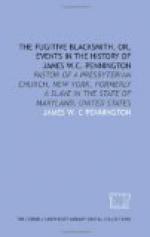It is but natural that the reader should wish to hear a word about the family I left behind.
There are frequently large slave families with whom God seems to deal in a remarkable manner. I believe my family is an instance.
I have already stated that when I fled, I left a father, mother, and eleven brothers and sisters. These were all, except my oldest brother, owned by the man from whom I fled. It will be seen at once then how the fear of implicating them embarrassed me in the outset. They suffered nothing, however, but a strong suspicion, until about six months after I had left; when the following circumstance took place:—
When I left my friend W.W. in Pennsylvania to go on north, I ventured to write a letter back to one of my brothers, informing him how I was; and this letter was directed to the care of a white man who was hired on the plantation, who worked in the garden with my father, and who professed a warm friendship to our family; but instead of acting in good faith, he handed the letter to my master. I am sorry that truth compels me to say that that man was an Englishman.
From that day the family were handled most strangely. The history begins thus: they were all sold into Virginia, the adjoining state. This was done lest I should have some plan to get them off; but God so ordered that they fell into kinder hands. After a few years, however, their master became much embarrassed, so that he was obliged to pass them into other hands, at least for a term of years. By this change the family was divided, and my parents, with the greater part of their children, were taken to New Orleans. After remaining there several years at hard labour,—my father being in a situation of considerable trust, they were again taken back to Virginia; and by this means became entitled by the laws of that state to their freedom. Before justice, however, could take its course, their old master in Maryland, as if intent to doom them for ever to bondage, repurchased them; and in order to defeat a similar law in Maryland, by which they would have been entitled to liberty, he obtained from the General Assembly of that state the following special act. This will show not only something of his character as a slaveholder, but also his political influence in the state. It is often urged in the behalf of slaveholders, that the law interposes an obstacle in the way of emancipating their slaves when they wish to do so, but here is an instance which lays open the real philosophy of the whole case. They make the law themselves, and when they find the laws operate more in favour of the slaves than themselves, they can easily evade or change it. Maryland being a slave-exporting state, you will see why they need a law to prohibit the importation of slaves; it is a protection to that sort of trade. This law he wished to evade.
“An act for the Relief of ——
of —— County. Passed January
17th,
1842.




